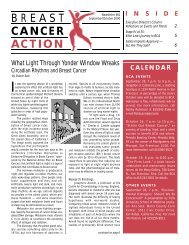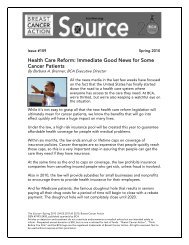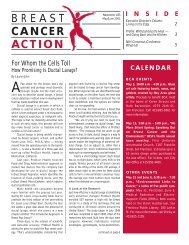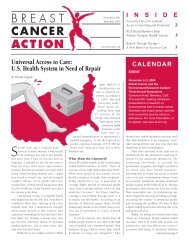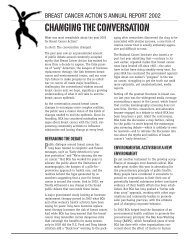2 FROM THE EXECUTIVE DIRECTORNot ChronicTreating <strong>Breast</strong> <strong>Cancer</strong> as a Recurrent DiseaseBy Barbara A. BrennerAs everyone familiar with breast cancer knows, there is noavailable cure for metastatic breast cancer (breast cancerthat has spread beyond the breast <strong>to</strong> life-sustainingorgans). In fact, metastatic breast cancer will kill awoman who has it unless something else kills her first.The good news is that some treatments can extend the lives ofsome women with metastatic disease by keeping metastaticbreast cancer from advancing, at least for a period of time. Thesetreatments are not without side effects, however. Some of thoseside effects are devastating.One thing I find interesting at this moment is that advances intreatment have led the cancer industry <strong>to</strong> begin <strong>to</strong> talk of breastcancer as a “chronic disease.”The term “chronic” appears <strong>to</strong> have many meanings. The use ofthe term in the context of breast cancer—metastatic or not—conveys an approach <strong>to</strong>, and an attitude about, the disease thatpoints in the wrong direction.Consider how Wikipedia defines “chronic” in the medicalsetting:A chronic disease is a disease that is long-lasting or recurrent.The term “chronic” describes the course of the disease, or its rateof onset and development. A chronic course is distinguishedfrom a recurrent course; recurrent diseases relapse repeatedly,with periods of remission in between.By this definition, metastatic breast cancer is recurrent, notchronic. While this might seem like an academic dispute,consider it from the viewpoint of a woman with metastaticbreast cancer. Rita Arditti, a cancer activist and active memberof the Women’s Community <strong>Cancer</strong> Project in Bos<strong>to</strong>n, and awoman living with metastatic breast cancer, has this <strong>to</strong> say onthe subject:<strong>Cancer</strong> is a progressive disease regardless of “personalmanagement” of the disease. In the case of diabetes, lifestylechanges (diet, exercise) are crucial because many times theycan allow the patient <strong>to</strong> avoid insulin or other treatments.Apparently, heart disease is in the same boat:lifestyle changes are crucial and, in many cases, havebeen able <strong>to</strong> control the disease.What are the lifestyle changes I can make thatwould put me in that boat? In fact, the whole issueof patient compliance is key for people with chronicillness. For cancer patients, I guess compliancemeans showing up for chemo or taking your pills.The other important point is that the treatments forcancer are, in some cases, worse than the diseaseand that secondary cancers are often a result of thetreatment of the first cancer. Injecting insulin daily isno fun, but the side effects of some cancer therapiesare frankly horrendous, and the uncertainty of theireffectiveness adds <strong>to</strong> the burden.It is one thing is <strong>to</strong> take insulin or some othertreatment that is known <strong>to</strong> help. But cancer patientsoften receive treatment with only the “hope” that itwill improve their cancer outcome, which may meanmonths of bad side effects for nothing. That adds abig stress fac<strong>to</strong>r <strong>to</strong> the whole picture. Uncertainty isall over the place with cancer, regardless of attitude,because we know so little and can do practicallynothing <strong>to</strong> improve the situation. Not having anycontrol is in itself terribly debilitating.continued on page 11
SPRING 2009 3BOOK REVIEWUnder the Radar:<strong>Cancer</strong> and the Cold Warby Ellen LeopoldRutgers University Press, 2009; $25.95Reviewed by Elayne CliftAmong my earliest memories are whispered grieving overa young mother in my <strong>to</strong>wn dying of breast cancer, greenx-rayed pictures of the bones in my feet when I needednew shoes, and ducking under my school desk duringnuclear attack practice drills. These events and others, from myyouth <strong>to</strong> my work in the women’s health movement 30 yearslater, filled my mind as I read Ellen Leopold’s well-documented,informative exposé of the relationship between Cold Warpolitics and cancer research and treatment.Leopold humanizes the s<strong>to</strong>ry by introducing Irma Natanson, ayoung mother in Kansas diagnosed with breast cancer in 1955.Natanson, one of the first women treated with cobalt radiation,suffered tragic results. We follow her s<strong>to</strong>ry, including the lawsuitshe brought against her radiologist, setting a precedent forinformed consent. A version of this account appeared in the Fall2004 issue of the Source, #83.Cobalt radiation in the 1950s was “inextricably tied <strong>to</strong> thehis<strong>to</strong>ry of the United States in the decade following the endof World War II.” Leopold carefully fleshes out this premise,revealing how even language fueled a postwar mentality inwhich communism, along with cancer, had <strong>to</strong> be defeated.Terms like “the cancer of communism” were commonly usedin Cold War propaganda, eachword having the power <strong>to</strong>terrorize, each being framed asa malignant parasite.We learn how a civilianeconomy more concernedwith profit than people came <strong>to</strong> rely on nuclear by-products,even in light of Hiroshima, even as nuclear testing in Nevadaand the Pacific began <strong>to</strong> yield worrisome outcomes, even aswhistleblowers in the medical and scientific communities werebranded “poor scientists” or “communists.” Leopold clearlyilluminates the relationship between the military, medicine, andthe nuclear industry.We learn that secret experiments involving the A<strong>to</strong>mic EnergyCommission, as well as the military and medical communities,were conducted largely on people of color as well as terminallyill patients <strong>to</strong> determine the effects of radiation on humans and<strong>to</strong> assess <strong>to</strong>xicity in cancer treatment. (Women were especiallyvulnerable <strong>to</strong> such treatment.) Often compared <strong>to</strong> the Tuskegeestudies of black men with syphilis, experiments involving wholebody radiation <strong>to</strong>ok place at such venerable institutions asM.D. Anderson <strong>Cancer</strong> Center, the naval hospital in Bethesda,continued on page 755 <strong>New</strong> Montgomery St.Suite 323San Francisco, CA 94105Phone: 415/243-9301Toll free: 877/2 -STOP-BCFax: 415/243-3996info@bcaction.orgwww.bcaction.orgBOARD MEMBERSDenise Wells, PresidentJane Sprague Zones, Vice PresidentAdrienne Torf, TreasurerBhavna Shamasunder, SecretaryClaudia Cappio, Diane Carr, Lindsey Collins,Elaine Costello, Tori Freeman, Dorothy Geoghegan,JoAnn Loulan, Belle Shayer (emerita),Lee Ann Slinkard, Dawn SurrattSTAFFBarbara A. Brenner, Executive Direc<strong>to</strong>rJoyce Bichler, Deputy Direc<strong>to</strong>rCristina Carrasquillo, Program Coordina<strong>to</strong>rZoë Chris<strong>to</strong>pher, Office ManagerSarah Harding, Individual Gifts OfficerAmy Harris, Development Direc<strong>to</strong>rKasha Ho, Program AssociateRichard Leiter, Communications Direc<strong>to</strong>rBCA SOURCEEdi<strong>to</strong>r: Richard LeiterEdi<strong>to</strong>rial Board: Barbara Brenner, Sarah Harding,Joyce Bichler, and Cristina CarrasquilloCopyediting: Robert GomezLayout: Yvonne Day, Y. Day Designs© BCA 2009, ISSN #1933-2408, published bimonthlyby BCA. Arti cles on detection and treat ment do notconstitute endorsements but are intended solely <strong>to</strong>inform. Call or e-mail for permission before reprinting.To subscribe, send name and address <strong>to</strong> BCA.Requested annual donation is $50, but no one isrefused for lack of funds.“<strong>Breast</strong> <strong>Cancer</strong> <strong>Action</strong>” and the BCA logo are the registeredtrademarks of <strong>Breast</strong> <strong>Cancer</strong> <strong>Action</strong>. All rights reserved.Not <strong>to</strong> be used without express written permission.



